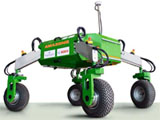Agricultural and Biological Systems Engineering, Department of

Department of Agricultural and Biological Systems Engineering: Faculty Publications
Document Type
Article
Date of this Version
2003
Citation
APRIL 2004 B I L L E S B A C H E T A L . 639-650
Abstract
To facilitate the study of flux heterogeneity within a region, the authors have designed and field-tested a portable eddy covariance system to measure exchange of CO2, water vapor, and energy between the land surface and the atmosphere. The combination of instrumentation used in this system allows high precision flux measurements without requiring on-site infrastructure such as prepositioned towers or line power. In addition, the system contains sensors to measure a suit of soil, climatic, and energy-related parameters that are needed to quality control the fluxes and to characterize the flux footprint. The physical design and instrument packaging used in the system allows for simple transport (fits in a standard minivan) and for rapid deployment with a minimal number of field personnel (usually less than a day for one person). The power requirement for the entire system (instruments and data loggers) is less than 35 W, which is provided by a companion solar power system.
Side-by-side field comparisons between this system and two permanent AmeriFlux sites and between the roving AmeriFlux intercomparison system are described here. Results of these comparisons indicate that the portable system is capable of absolute flux resolutions of about 61.2 mmol m22 s21 for CO2, 615 W m22 for LE, 67 W m22 for H, and 60.06 m s21 for u* between any given 30-min averaging periods. It is also found that, compared to a permanent Ameriflux site, the relative accuracy of this flux estimates is between 1% and 7%. Based on these results, it is concluded that this portable system is capable of making ecosystem flux measurements with an accuracy and precision comparable to most permanent AmeriFlux systems.
Included in
Bioresource and Agricultural Engineering Commons, Environmental Engineering Commons, Other Civil and Environmental Engineering Commons


Comments
2004 American Meteorological Society